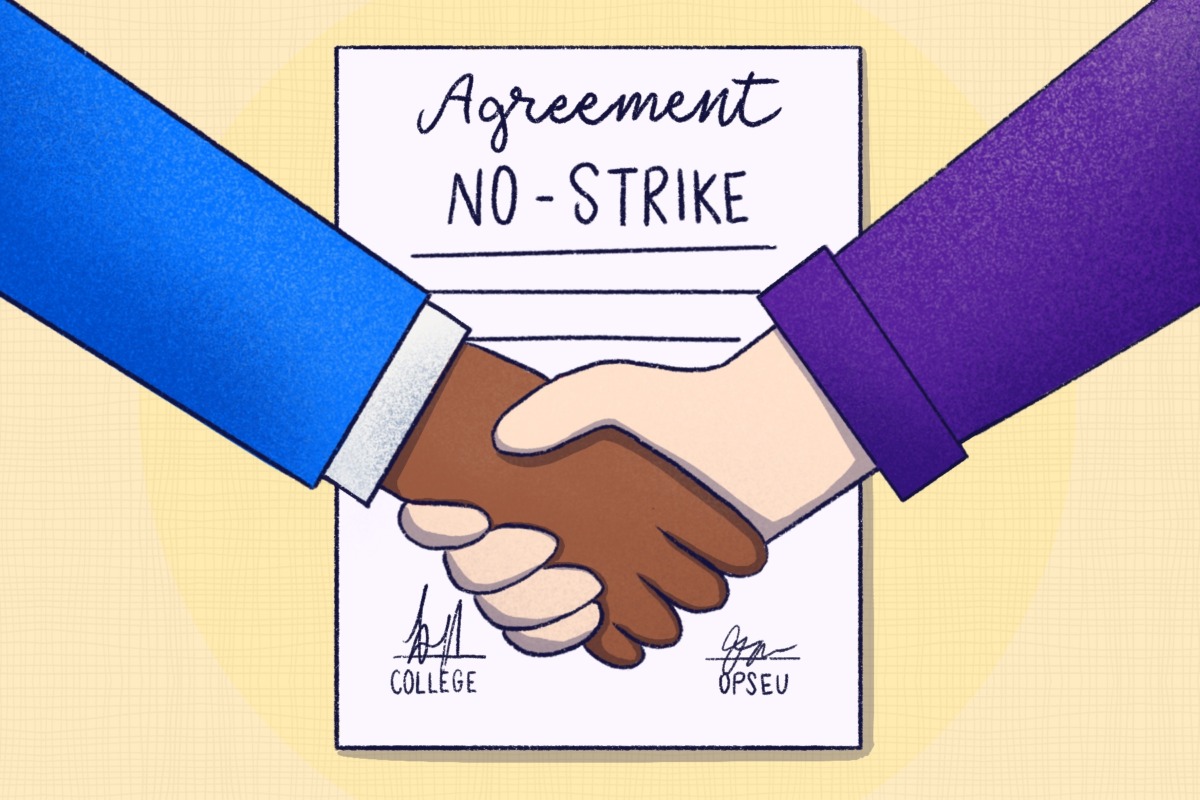No interruptions coming to Winter 2025 semester with faculty strike avoided.
Classes will carry on as usual, as the risk of a strike by college faculty has been avoided.
Both the union representing the more than 15,000 faculty members and the College Employer Council (CEC) have agreed to binding arbitration, ending the risk of a strike. If this had not happened, faculty could have walked off the job starting Jan. 9.
This news comes after more than six months of negotiations between the two sides, who remained far apart on many issues. The latest bargaining which solidified some wins for the union – not only included “significant benefit gains” for those they describe as their most precarious workers, but also saw the CEC withdraw significant concessions – took place over two days on Jan. 6 and 7.
“Things changed at the bargaining table over the course of Jan. 6 and 7. The historic strike mandate was the key to the movement that we finally saw from the employer bargaining agent on those days. Using the leverage of the impending strike, the faculty team was able to compel the CEC to withdraw significant concessions. There was more movement from the CEC in these two days than there had been in the previous six months—and that was precisely because the CEC saw faculty engaged in preparations to withdraw their labour,” said Jeff Brown, chief steward/2nd VP, with OPSEU. “With some of the harmful concessions proposed by the employer that would erode our working conditions taken off the table—and with mediator Kaplan stating that the two sides had reached an impasse—the faculty team made the decision that sufficient progress was made on key priorities to clear the way towards a fair deal through mediation-arbitration and that strike action would not advance these priorities more effectively. A strong strike mandate—and workers’ resolve to act upon it—can make an impact, even if it doesn’t result in an actual strike—and that’s what happened here.”
Brown adds that they are “pleased we were able to defend faculty working conditions and student learning conditions without any disruption to the semester.”
Despite the strides made in bargaining, it was determined that binding arbitration was needed to deal with all outstanding items.
In a release made last week, the CEC noted that there were many demands the union was putting forward that they deemed “wholly unaffordable.” They say the cost of these demands could surpass $1-billion and includes things such as a 25 per cent reduction in the average teaching time for professors.
If a strike were to have taken place, it was very likely that classes would have been cancelled and most George Brown College (GBC) services would have had to change or limit the way they served students; including the Student Association (SA).
Rosalyn Miller, general manager with the SA is happy that a strike will not happen and the semester can continue as normal. She notes that as a student union, the organization was ready and willing to support striking faculty, should they have taken to the picket line.
“As a student union and as a union ourselves, we are always looking at ways we not only ensure that the interests of our students are protected, but the interests of union bodies that represent others. As a student union, we have communicated that to OPSEU, that we are here to provide any support or assistance during the strike to the best of our abilities, and we had an understanding of how that could work,” she said. “Communication that would have gone out if there was a strike, the communication would have said, the Student Association, programs and services continue. The Student Association doors remain open. The college is well aware of that. As a matter of fact, the Student Association was going to open their lounges to the striking teachers to allow for warmth or for them to be supported.
She adds that services such as the Student Nutrition Access Program would have remained open or added a delivery model to ensure students could collect food, while others would have adapted to the situation to serve students in a different way – such as online events and supports.
College executives are also pleased with this outcome, with the office of the GBC president issuing a statement on behalf of the college.
“I am pleased to report that the College Employer Council and OPSEU, the union representing full-time and partial-load academic employees at Ontario’s 24 publicly funded colleges, have mutually agreed to enter into binding arbitration. This means that full-time and partial-load academic employees at George Brown College will not be going on strike, and classes will continue as scheduled. As always, student success remains our top priority, and this development allows us to move forward into the academic year without interruption, fully focused on supporting our students in achieving their academic goals. Thank you all for your patience and understanding throughout this process. Together, we will ensure a positive and impactful year ahead.”
The last time a college faculty strike took place was 2017.
The union adds that their fight is not over as they continue to fight for students.
“This isn’t over. We will continue to fight for the funding and support our colleges desperately need. The students and faculty of Ontario deserve nothing less.”


